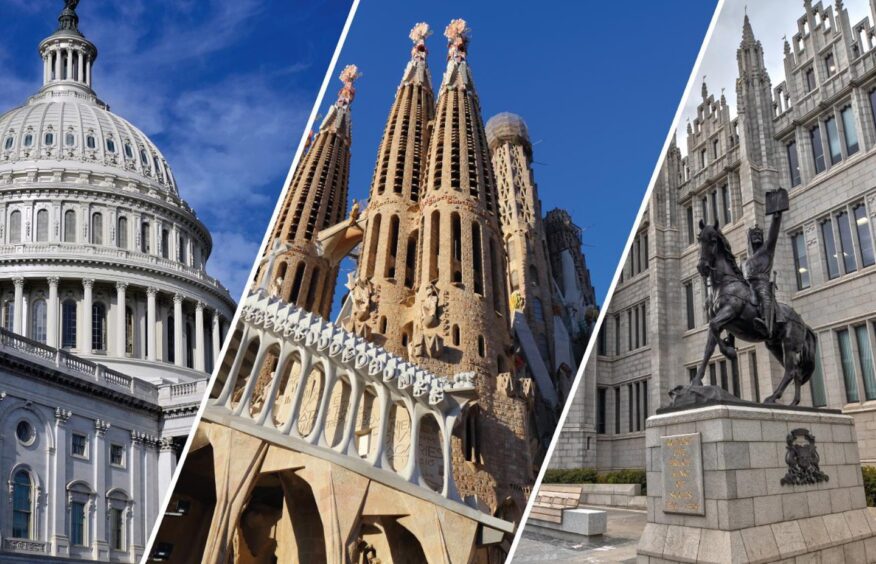
By Stuart Broadley, CEO, Energy Industries Council
-
Some Energy Voice online content is funded by outside parties. The revenue from this helps to sustain our independent news gathering. You will always know if you are reading paid-for material as it will be clearly labelled as “Partnership” on the site and on social media channels,
This can take two different forms.
“Presented by”
This means the content has been paid for and produced by the named advertiser.“In partnership with”
This means the content has been paid for and approved by the named advertiser but written and edited by our own commercial content team.
The late, great Ian Dury wrote his classic song “Reasons to be cheerful, Pt 3,” a song about things that made him happy, in 1979, which was also the year Margaret Thatcher came to power.
One. Two. Three. Cities of the world:
1. Washington DC
I’m writing this article while watching the ceremony of the re-inauguration of US President Donald J Trump in Washington DC.
Trump reaffirms in front of fanatical crowds his love of “liquid gold” and “drill, baby, drill”, and his hate of “windmills”, all under the banner of his MAGA (Make America Great Again) campaign.
Trump’s ambition, clarity of message, conviction and focus on execution are an inspiration for many, but others say: “It’s not the way we do things here.”
Whatever you think about Trumponomics, the US is getting more competitive, while Europe gets less so, and this gap is widening quickly.
Trump may be focused on winning the economic war against China, but Europe is being hit by friendly fire, and this heat is surely going to rise, while European energy transition dreams are increasingly looking unaffordable.
2. Barcelona
I’m writing while in a Barcelona hotel, about to attend an offshore wind conference. Spain hit UK headlines in recent months for three reasons – the deadly floodwaters that killed at least 232; being the 2024 top-rated OECD economy to invest in; and its recent 100% tax plans for UK expat homeowners.
Spain, like many other countries, is balancing multiple factors including having a competitive and investable economy, meeting stringent net-zero targets, having security and homes for its citizens, and growing its international trade, influence and tourism.
3. Aberdeen
My home is not in Spain though, but Aberdeen, a city under fire, an oil and gas industry under threat from UK politicians in the name of energy transition, sugar coated as a just transition, but certainly not seen as liquid gold.
Energy Secretary Ed Miliband is dogmatic in his belief that UK oil and gas is bad for free market economics, and bad for UK energy costs, and has bet all chips on a more rapid energy transition to renewable power.
In 1979, Margaret Thatcher infamously oversaw her own energy transition, taking on the coal industry in the name of free market economics and low-cost energy, indeed successfully kick-starting the end of UK coal, now 45 years later finally eliminated from our power supplies.
But this came at a hefty cost, with the destruction of countless coal mining communities, very much the downside of dogma, delivering notably the most unjust of transitions.
Residents, homeowners and business leaders in the Granite City and Shire fear history will repeat itself.
Will 2025 be as unsettling as 2024? I hope not, and I am determined to lean into more positive vibes as I race into 2025.
One. Two. Three. Reasons to be cheerful:
1. Less is more
This year benefits from not being 2024, the year when nearly 50% of the world’s population went to the polls, surely meaning more stable leadership delivering less uncertainty.
Populists, climate activists and tax-and-spend socialists alike, we all enter 2025 knowing more than we did a
year ago.
The fragile Gaza ceasefire and the return of hostages reminds us that conflicts can and do end, and more diplomacy does lead to less war.
Less war means more trust, which allows more trade, and ultimately more access to competitive technologies and global supply chains, unlocking more net-zero progress.
2. The ‘boomiest’ years
EIC members reported their “boomiest” levels of average revenues ever, with nearly 70% of firms delivering record revenues in 2023, rising to more than 95% in 2024.
The reasons for booming energy supply chains are clear – oil and gas commodity prices have been high and stable for long enough that operators have confidence to launch waves of new capex projects, fed by growing energy demand and population.
The world produced and used more oil and gas (and coal) in 2024 than ever.
Renewables have also accelerated, with nearly 10GW of offshore wind installed globally in 2024, driven by high FID (final investment decision) rates a decade ago – but renewable FID rates today are much lower, and lag far behind those of oil and gas. Supply chain companies no longer invest on net-zero pledges and promises, but on FIDs and orders.
As the oil and gas order intake of the ready-now energy supply chain filled, so they invested, trained, expanded and delivered.
They delivered profits, growth, jobs and tax revenues, based on their 50 years of proven oil and gas capabilities, on their competitive cost base, and on their global reputation for service, innovation and technology.
The supply chain can do this for net-zero as well, and wants to, but only when the volume of green opportunities converts into real volumes of order intake, volumes that match and then exceed that of oil and gas.
3. Keep learning
I am convinced that business leaders have not forgotten the painful lessons they learned looking back to the severity of the 2014 oil crisis.
The No 1 lesson learned was: Never again rely on just oil and gas for their futures.
EIC’s Survive & Thrive research confirmed back then that companies preferred a diversification growth strategy.
The recent boomiest years have not signalled a lazy return to 100% oil and gas, but with lack of renewable opportunities to harvest, companies have quickly diversified to non-renewable sectors to stay resilient, such as nuclear, marine and infrastructure.
Postscript
There is one more reason to be cautiously cheerful – the recent good news that the UK’s Department for Energy Security and Net Zero has confirmed a consultation on the future of UK North Sea oil and gas licensing rounds.
As Energy Voice reported, Ed Miliband knows, “Brits don’t want ‘culture wars’ on climate policy”, and Trump also weighed in, slamming, UK’s “mistake” on UK oil and gas taxes.
For all the reasons I see to be cheerful, the best is learning that policy-makers will now consult fully with industry, being then responsible for acting in good faith, based on the outcomes of that consultation.
That is the role of government after all, to work and strive for us, not the other way round.
Find out more from Energy Industry Council.
Recommended for you

 © Supplied by Energy Industry Coun
© Supplied by Energy Industry Coun